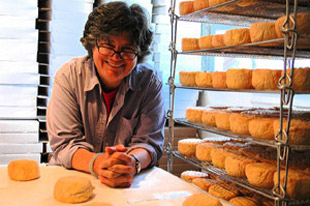CLIO Talks Back

Karen Offen
United States
Archive
- Jun 2011
- May 2011
- Apr 2011
- Mar 2011
- Feb 2011
- Jan 2011
- Dec 2010
- Nov 2010
- Oct 2010
- Sep 2010
- May 2010
- Apr 2010
- Mar 2010
- Feb 2010
- Jan 2010
- Nov 2009
- Oct 2009
- Aug 2009
- Jul 2009
- Jun 2009
- May 2009
- Apr 2009
- Mar 2009
- Feb 2009
- Jan 2009
- Dec 2008
- Nov 2008
- Oct 2008
- Sep 2008
- Aug 2008
- Jul 2008
- Jun 2008
- May 2008
- Apr 2008
I.M.O.W.'s debut blog, Clio Talks Back, will change the way you think about women throughout history! Be informed and transformed by Clio Talks Back, written by the museum's resident historian Karen Offen.
Inspired by Clio, the Greek muse of History, and the museum's global online exhibitions Economica and Women, Power and Politics, Karen takes readers on a journey through time and place where women have shaped and changed our world. You will build your repertoire of rare trivia and conversation starters and occasionally hear from guest bloggers including everyone from leading historians in the field to the historical women themselves.
Read the entries, post a comment, and be inspired to create your own legacies to transform our world.
Women's History Month gets Creative and Business-minded at I.M.O.W.
2009-03-24 00:00:00.000
By Constanza Svidler, Education Manager and Event Organizing Extraordinaire
I.M.O.W. continued its Women's History month festivities with two public events in partnership with the San Francisco Public Library. The museum organized two very distinct programs that celebrated San Francisco Bay Area women's creativity, artistry, and originality.
Exploring Womanhood & Transformation
with Kirya Traber, Poet and ActivistOn Thursday March 12th, spoken word artist and activist Kirya Traber challenged those in attendance with her hybrid performance, Exploring Womanhood & Transformation. Part cultural studies seminar, part poetry workshop and all participatory spoken word performance -- the evening brought together a diverse and engaged crowd.
Traber seamlessly turned the Bayview Branch of the San Francisco Public Library into an intimate gathering. Breaking the ice, she asked all in attendance to share with each other the last time they felt powerful. She continued to challenge those assembled to think about why we still need to celebrate Women's History Month and to question gender stereotypes.
This thought-provoking conversation led to a participatory activity, where each individual anonymously provided a one-word answer to questions posted all around the room:
"What are you?"
"What is the one thing would you change about yourself?"
"Where do you belong?"
"What is your definition of love?"
"What is your last word?"
The answers became a collectively-written poem to introduce Traber's own work. You can learn more about Kirya Traber's poetry by visiting www.myspace.com/kiryatraber.
Creating a Business with a Mission
A Delicious Talk from Cowgirl Creamery's Sue ConleyOn Wednesday March 18th, I.M.O.W. celebrated a different kind of creativity. At the Mission Branch of the San Francisco Public Library, the museum welcomed Sue Conley, co-founder of Tomales Bay Foods and Cowgirl Creamery, for a delicious talk detailing how she created a business with a mission.
Conely welcomed her audience by prepping bite-size pieces of cheese--Cypress Grove's Humboldt Fog, Bellwether Farms' Pepato, and her own Mt. Tam, Conley--on tasty crackers. She informed the delighted crowd that all the cheeses were made by women in Marin.
A chef by training, Conely, in partnership with Peggy Smith, established Tomales Bay Foods with a mission to provide a market for agricultural goods from the Tomales Bay region so that the farmers might stay in business and prosper. Along with becoming a distributor for her own small-production cheese, the company leveraged personal relationships to represent producers from the area
As Conley unraveled the history of Tomales Bay Foods, recognizable names like Nan McEvoy and Bill Niman became McEvoy Olive Oil and Niman Ranch Meats. In between talking about how Marin County became what it is today and eating cheese, Conley shared the types of amusing anecdotes that only come from one who has known the producers of such quality foods intimately. Conley shared stories such as taking Mary Matos to Williams-Sonoma to meet with the store's founder, Charles Williams, where Ms. Matos went in her milking smock thinking that they were going to a store, not the retail chain's headquarters.
Cowgirl Creamery is (luckily for us) located in the San Francisco By Area. For more information, visit www.cowgirlcreamery.com.
Happy Women's History Month!
More about the history of ?women?s work?
2009-03-23 23:20:25.000
Women?s history month offers us an opportunity to think about the history of ?women?s work.? Clio has long been concerned about this topic, particularly with reference to the issue of money and value. Clio asks: who decides what ?value? is, who gets paid for doing what, and why? And how much? Or how little?
We know from examining women?s history that ?women?s work? encompasses many tasks (some agreeable and others onerous) for which women have never been paid. So how can some people today still treat paid employment as the sole form of ?women?s work?? What planet are they living on?
Clio?s colleague Ellen Fleischmann, who studies the history of women in the Middle East, has signalled another aspect of ?women?s work? ? another form of unpaid work that women do and have done on behalf of the societies they live in or aspire to create. Let?s hear what she has to say about this question, with respect to the development of nation-states ? long a topic in ?men?s? political history.. This is ?political? work for which women have rarely gotten the credit they deserve, much less any form of pay. This seems to be a universal phenomenon.
?Women?s work? ? whether supporting the nationalist struggle or engaging in social welfare activities oriented toward ?uplifting the nation? ? has too often been considered auxiliary, conservative, and nonpolitical. Rethinking both feminism and nationalism requires eschewing gendered notions of politics and resistance. In the nationalist context, gendered notions of what was considered meaningful in the way of ?active? or ?passive? resistance have contributed to obscuring the nature of women?s participation. The kind of work women engaged in was crucial to the nationalist struggles; for one thing, the fact that women were involved at all contributed to legitimizing nationalism as a communal, collective, unifying ideology. For another, no movement can endure without the sustenance of daily, mundane ?support? activities. The provision of necessities such as food, medicine, and funds; and, on another level, the dissemination and use of information for intelligence and propaganda purposes, are not secondary. History?s gendered focus on the ?main? struggle ? armed battles and rebellions, confrontations between nationalist leaders and colonial powers, diplomatic and political maneuverings ? obscures the urgent necessity of the work that takes place in what is perceived as the margins. It is perhaps only because the ?marginal? work is performed by women that it is considered the footnote to the nationalist narrative rather than constituting the ?real? work in and of itself. A history that expands the central narrative to incorporate the margins and that recasts these limited concepts would allow us to more fully recognize the complete contours of the nationalist narrative in all its richness and complexity.?
Clio says: this is what women?s history is all about ? rethinking and expanding the central narrative to the point where the activities can be taken into account, and the criteria for value of "women's work" rethought.
Clio asks you: what aspect of history?s central narratives have you questioned lately?
Source: Ellen Fleischmann, ?The Other ?Awakening?: The Emergence of Women?s Movements in the Modern Middle East, 1900-1940,? in A Social History of Women & Gender in the Modern Middle East, ed. Margaret L. Meriwether & Judith E. Tucker (Westview, 1999), pp. 89-139; quotation pp.114-115.
What is "women's work"?
2009-03-23 23:12:38.000
Clio has been reading a new book called ?Getting to 50/50: How Working Couples can Have it all by Sharing it all, and Why it?s Great for Your Marriage, your Career, your Kids. .. and You.? The authors are two young Californian mothers who are trying to combine professional careers with family life ? a dilemma that is troubling a lot of young women today.
Clio is concerned about one thing, however. In this book, the authors, Sharon Meers and Joanna Strober, treat ?women?s work? as what they get paid to do. Employment for money is the important thing. That is ?work.? The lessons of the book revolve around splitting household labor with paid labor, but the authors never question the thinking that equates ?women?s work? with their employment.
Yet one of the great feminist insights of the last 30 years is precisely that women?s work is ?never done,? and that ?work? or ?labor? encompasses far more than what one gets paid to do. Indeed, it embraces most of what women do ? and don?t get paid for.
This aspect of thinking about ?women?s work? is not new. It dates well into the early nineteenth century, when male political economists began to think about ?economics? exclusively in terms of paid jobs for breadwinning men that would enable them to ?support? wives and children. Even then, feminists fought back against this type of thinking. Even then, some wrote poignantly about this problem and even demanded pay for housework.
Listen to what one woman in France had to say on this subject. Jeanne Deroin was a married woman, an employed woman and a mother. In 1848-49 she campaigned for women?s rights, including the vote for women, and posed her candidacy (unsuccessfully) for the French legislature. She was, in fact, the first woman in Europe and perhaps in the world to run for political office. Here are her reflections about ?women?s work? in reference to the poor women of Paris in the early 1850s.
Women?s Work
?It is in the household that woman?s work is the most tiresome and the least appreciated.
?We are not speaking of a household where there is a live-in nurse and a maid for each child, and domestic servants to do all the work; we are speaking of the majority, of the proletarian household, where the mother alone cares for several children, where there is not always means to pay the laundress, where the wife must get up before dawn, often exhausted by having had to nurse her newest child through part of the night. She lights her stove and prepares her wash water, in order to wash her children?s clothing and the diapers. Moreover, she hasn?t enough of anything to be able to wait a week; the lodging is small, the basins inconvenient; the sink is either one floor up or two floors down, and the stairway is dark. Her husband gets up to go to work; his pants are torn and must be mended but a child cries or the clay casserole tips over; the woman runs; the husband gets impatient; the repair gets done. He leaves and the washing begins. The two biggest children get up and ask for their breakfast; the littlest ones cry to be gotten up; the sudsing finished, she hangs out the wash as best she can, wipes up the spilt water, makes the soup, dresses the littlest children and gives everybody breakfast; she puts some bread in the baskets of the bigger children and sends them off to school; she has not yet had time to sit down for an instant in order to nurse the little one who is crying loudly.
?The landlord?s wife enters: she is an early riser, a woman of order, a good housewife who does her own canning and makes her own jam, repairs her laces, cleans her own ribbons and embroiders her collars. Everything is neat and tidy in her quarters before nine o?clock. She rouses her maid and her domestic at five a.m. and supervises them, pushes them, prods them, so that the tasks get done promptly and well. Thus, upon entering, she is indignant at the laziness and disorderliness of her renter. The beds are not yet made, the room is not swept; the chipped bowls used for breakfast are still sitting unwashed on the floor; the poorly bleached diapers hang on the line, the torn caps and socks full of holes dry on the back of a chair. She concludes from all this that her renter doesn?t get up early enough and doesn?t work hard enough. She asks for the rent more severely than she might have otherwise and leaves, threatening to throw them all out if it isn?t paid by the fourteenth.
?Upset and already exhausted with fatigue, the poor wife nurses her infant, changes it and puts it back in the cradle, and leaves it in the charge of an obliging neighbor?s children so that she can run to the central market to buy potatoes a bit cheaper. She returns in haste, loaded down, breathless and perspiring. She nurses the infant to stop its crying, puts her irons on to heat, peels her vegetables, irons the caps, mends the vests and pants, fixes the shirts, darns the socks, repairs the slippers, and prepares dinner.
?The children come home from school: one has torn his blouse, the other has a bump on his head. She scolds the first one and bandages the second. During this time the potatoes have burned; her husband returns, and the soup is not yet poured over the bread. He is tired and in a bad mood, and displays his astonishment that a woman who has nothing to do but take care of her house is incapable of getting up dinner. He sulks or flies into a rage and, when dinner is over, he goes to bed. The wife undresses and puts the children to bed, washes the dishes, and is able to mend the most urgent items. But she has to interrupt her work every few minutes to calm the baby, whose cries are waking up its father, who gets upset at not being able to sleep and recover from the fatigue of the day. Often the poor baby has been changed with a diaper that is still wet; he gets colic, and the mother spends part of the night calming him. She scarcely gets a few hours of sleep and wakes up only to recommence the same life. And they say, in speaking of her, that only her husband works; she doesn?t do anything. She has only her household and her children to take care of.?
When Clio first read this account some 130 years later, she cried. Who among us has not confronted a similar experience?
Source: Jeanne Deroin, ?Le Travail des femmes,? Almanach des Femmes (1852), as translated by Karen Offen and published in Victorian Women (Stanford University Press, 1981), pp. 304-305.
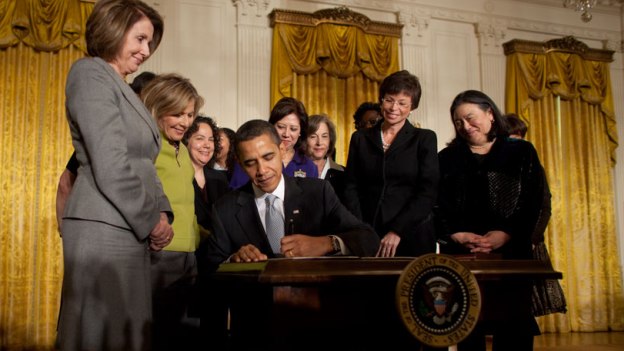
U.S. President Barack Obama signs an Executive Order creating the White House Council on Women and Girls.
New Gains for Women?
2009-03-17 00:00:00.000
By I.M.O.W. Founding President and Board Chair Elizabeth L. Colton
Last week on International Women's Day (March 8, 2009), U.S. President Barack Obama created the White House Council on Women and Girls. This interagency council, made up of cabinet members and high level appointees, will "work across executive departments and agencies to provide a coordinated Federal response to issues that have a distinct impact on the lives of women and girls."
Some women's advocates believe that a Presidential Commission or a cabinet level appointment would carry more weight, and it seems appropriate to ask if there is staff and a budget assigned to this Council to give it real teeth. But I believe it is clear from President Obama's first weeks in office that the status of women and girls both nationally and internationally is a priority to his administration.
One of President Obama's first acts was to rescind the so-called "gag rule," which had kept federal funding from U.S. family planning groups working internationally. He has restored U.S. funding for the United Nations Population Fund (UNFPA), which provides a range of reproductive health services, and rescinded the "conscience" rule, one of the most egregious of President Bush's so-called "midnight regulations" that would have substantially weakened women's access to reproductive health services. Next up: President Obama signed the Lilly Ledbetter Act for equal pay.
But you could barely find a report in any news source of my favorite new appointment (thanks to Women's eNews for bringing it to my attention). On March 8 President Obama created a new ambassador-at-large for international women's issues, and named Melanne Verveer for the job. Imagine, an ambassador for international women! Verveer is the co-founder of Vital Voices Global Partnership, an international nonprofit that invests in emerging female leaders, and was Hillary Clinton's chief-of-staff in the Clinton administration where the two worked together to raise the status of women internationally. I can imagine great advancement ahead from the continuation of this partnership.
Even on Capitol Hill there is progress: the U.S. Senate created a Foreign Relations subcommittee that will focus on the global status of women, led by Senator Barbara Boxer, D-California. Our government leaders, the World Bank, and the United Nations all recognize that the safety, education and empowerment of women and girls is mandatory to making positive social change, and benefits entire communities.
So, are we on the right track? Perhaps. But consider this: here in the U.S. women only make up only 17 percent of Congress (we rank 71st in the world in women's political representation). Even President Obama's new cabinet has only four women--a mere quarter of the total. As my friend and I.M.O.W. partner Marie Wilson says, "Women are empowered but not in power." (View Wilson's Huffington Post article.) Women remain the large majority of the world's poor and illiterate, and are constantly subjected to violence, abuse and oppressive laws.
As New York Times columnist Nicholas Kristof recently put it, gender inequality is "the dominant moral challenge we face in the 21st century." So bring on all the ambassadors and councils. We have our work cut out for us. I am proud to have national leaders who recognize the immense inequality that remains globally between women and men. And I am proud of I.M.O.W. for working to raise the voices of women around the world, and proud of the work of all of our sister organizations. But we are not done yet. Not by a long shot.
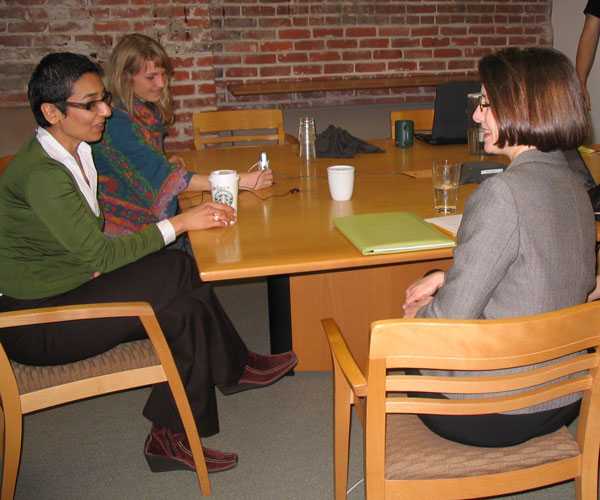
Catherine (right) poses the community questions to Zainab (left) while Kathryn (back) manages the audio recording.
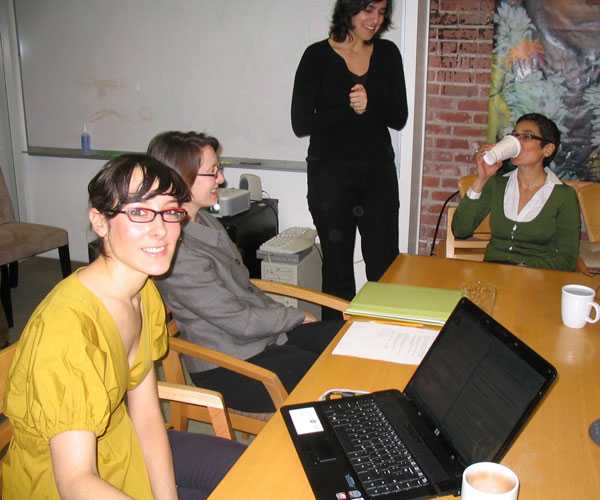
Sanja manages the moderator postings during Zainab's live chat.
Behind the Scenes of our First Live Web Chat
2009-03-06 00:00:00.000
By the I.M.O.W. Team
You may have noticed that we recently launched our new chat feature on the very same day that we hosted our first online discussion. We've always wanted to host live chats, but until recently, didn't have the technology for our site.
When the opportunity to host an online chat with Iraqi-American author and activist Zainab Salbi presented itself, our team just couldn't pass it up! Zainab is an I.M.O.W. Global Council member and co-founder of Women for Women International. She was in town for our Annual Gala a few nights earlier, where she captivated our audience as the keynote speaker.
On Friday, March 6, 2009, we hosted I.M.O.W.'s first-ever Web chat, with Zainab Salbi as our guest speaker. It was a little nerve-wracking, to say the least, to try out our brand-new chat tool with such a distinguished guest, but we're happy to report that, despite a few glitches, our first online chat was a wild success! Community participants logged in and submitted questions from across the U.S., Sudan and Turkey.
The conversation was incredibly rich, touching on Zainab's diverse experiences working with women in post-conflict regions and her expert analysis of socio-political situations in her native country of Iraq and elsewhere.
We even heard more about Zainab's love for Rumi poetry and how dance keeps her resilient, despite her demanding schedule and intense work. It was a wonderful experience for our community to connect with such an inspiring person online.
Read the transcript of Zainab's live Web chat. Now that we've gotten a taste of what it's like, we're excited to do more! Stay tuned for more live chats with our network of dynamic women leaders.
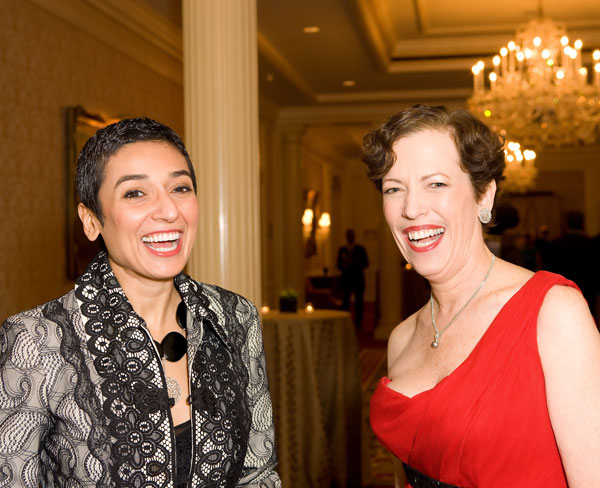
Featured Gala Speaker Zainab Salbi and I.M.O.W. Board Chair Elizabeth Colton greet each other before the event begins.
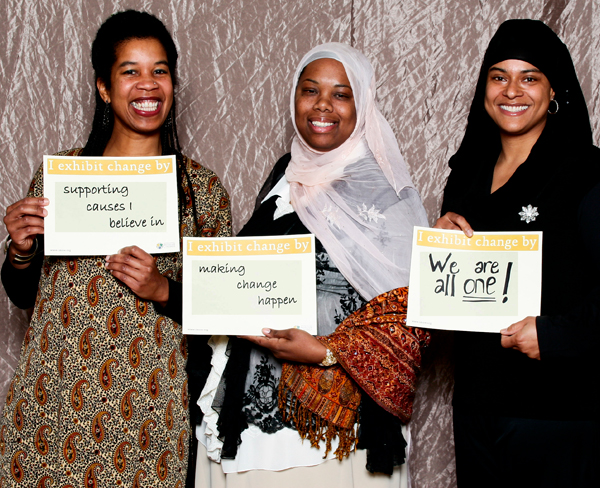
Guests representing the Global Fund for Women pose with their answers to the question: How Do YOU Exhibit Change? View more photos from our Exhibiting Change photo booth.
Exhibiting Change at the I.M.O.W. Gala: A Celebration of International Women's Day
2009-03-05 00:00:00.000
By Jo Beaton, Marketing and Communications Manager and the media's go-to person for all things I.M.O.W., and Renee Gasch, Online Promotions Coordinator and the online community's biggest fan!
For nearly 100 years, International Women's Day has been global day of celebration and activism connecting all women around the world and inspiring them to achieve their full potential. The purpose of this day directly parallels the purpose of the International Museum of Women, a social change museum that matters because it too connects people-with new ways of thinking, and inspires them-to take actions that will transform people's lives.--Elizabeth L. Colton, speaking at I.M.O.W.'s Annual Gala 2009
It was a night of celebration, meaningful conversation and generous support on Wednesday evening March 4 at I.M.O.W.'s Annual Gala 2009.
Guests arrived at the Ritz-Carlton in San Francisco dressed to impress and radiating enthusiasm for I.M.O.W.'s mission and work. They greeted familiar faces from San Francisco's women's organizations and businesses, stopped by the Web kiosks for tours of I.M.O.W. exhibitions, and beelined over to the photo booth where they posed with signs expressing their personal answers to the question: "How do you Exhibit Change?"
They could not have been more excited! Individuals, pairs and whole groups of guests grabbed signs and snapped nearly 200 photos. I.M.O.W. staff and volunteers transformed those pictures into a slide show that played on large screens throughout dinner and printed photos for guests to take home as a souvenir of their evening. To view the photos, click here.
Guest speakers included I.M.O.W. Board Member and Honorary Gala Chair Jennifer Siebel Newsom and her husband, San Francisco Mayor Gavin Newsom. Jennifer highlighted her favorite stories in the museum's exhibitions, including the story of Granny "D" Haddock, who at age 94 campaigned for a New Hampshire senate seat against an entrenched incumbent by walking across the state five miles at a time, and the story of Sibongile Masuku, a member of South Africa's environmental commission who told her male colleagues that true conservation was not possible without tapping into knowledge of indigenous women-who have been saving the environment long before it was fashionable to do so.
Mayor Newsom, a steadfast supporter of I.M.O.W. and women's rights legislation in San Francisco, spoke about his pride in the fact that the museum calls San Francisco home. He delivered impassioned words about women's rights as they relate to the topic of same-sex marriage, an issue which has been significant to his governorship. During his term in office, gay marriage was legalized in the city of San Francisco, but the decision was overturned in a state-wide majority vote in November 2008. He said that if we allow a simple majority to overturn constitutional rights for same-sex couples, then we should be concerned about constitutional rights for any social group, including women.
The evening's emcee, broadcast journalist Jan Yanehiro, moved the evening along nicely, and the museum's Board Chair Elizabeth Colton shared I.M.O.W.'s accomplishments and spoke energetically about the museum's upcoming online exhibition on themes of women and the economy, which will launch in October 2009. She thanked the Gala's presenting sponsor, Wells Fargo Bank and the tireless Gala Chairs, Stacey C. Fleece and Marie Louise Hurabiell as well as the Honorary Chairs Gavin and Jennifer Seibel Newsom, George P. Shultz and Charlotte Maillaird Schultz, "for exhibiting their gracious spirit and enthusiastic work on behalf of the museum."
The highlight of the evening was the keynote speech given by I.M.O.W Global Council Member Zainab Salbi, a moving champion of women survivors of war and founder of Women for Women International. She captivated the audience with stories of how she and her mother never stopped dancing, even in the midst of the horrors of the Iran-Iraq war. She spoke of other courageous women from Bosnia to Kenya that she has met through her work who overcame the odds to start small businesses, became engaged citizens and filled leadership positions.
Ms. Salbi also called for a reconciliation process between the U.S. and Iraq and emphasized that women need to be a part of the "macro solutions," for example, at decision-making tables and in high profile leadership roles, not just the "micro solutions." She ended her speech with lines from a Rumi poem and received a standing ovation from the crowd:
Dance, when you're broken open.
Dance, if you've torn the bandage off.
Dance in the middle of the fighting.
Dance in your blood.
Dance, when you're perfectly free.
-- Jelaluddin Rumi (13th century)
Thank you to all in attendance for your gracious support of I.M.O.W.!
I.M.O.W.'s Friends in the Blogosphere
2009-03-03 00:00:00.000
By Laura Hannemann, Exhibitions and Programs Intern and Blog Outreach Specialist!
The Internet is a seemingly boundless resource of writers who inspire change everyday. Recently we have been contacting some of our favorite bloggers in an effort to expand our community and raise awareness about the museum.
Thanks to everyone who posted! It has been a joy to discover the amazing work of women and men who are blogging for social change. Here are a few of the generous responses we have received:
- Rachel from Feministe was wowed by the breadth of the exhibition. View post >
- Lisa, who writes for both My Ecdysis and Bitch Magazine, warns our new viewers that they can “look forward to digging up the museums deepest treasures.” View post >
- Sally McGraw offers a witty and inspiring take on fashion in her blog Already Pretty. She was kind enough to compliment our “fascinating videos and beautifully composed articles.” View post >
- Jessica from Jessica Knows was “unbelievably excited” to share the I.M.O.W. with her readers. She writes, “Count me as one of those women inspired.” View post >
- Heart writes for Women’s Space and she says of WPP, “It’s inspiring and we need to be inspired right now.” View post >
- Chally from Zero at the Bone compliments our “real engagement with women worldwide” and calls WPP “simply amazing.” View post >
Thanks again to all of the other writers who generously took the time to write about the I.M.O.W. If you would like to post a review of I.M.O.W.'s exhibitions on your blog and would like supporting materials, email submissions.globalfundforwomen.org.
Welcome to the I.M.O.W. Blog!
2009-03-01 00:00:00.000
By the I.M.O.W. Team
Welcome to our newest blog! The purpose of the I.M.O.W. Blog is to create a space where everyone can access the latest news from the museum. We will have regular posts from members of our team so that you can keep up with events, exhibition developments, and department updates.
Also, we will be highlighting some of our phenomenal supporters including contributing artists and sister organizations. We want this to be a resource both for new visitors and longtime members. Check back soon, and join the discussion. We look forward to hearing from you!



